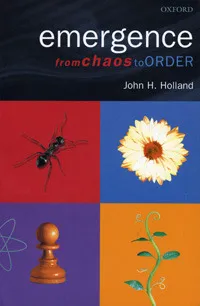Emergence from Chaos to Order
By (author): "John H. Holland"
Publish Date:
1998
ISBN0192862111
ISBN139780192862112
AsinEmergence from Chaos to Order
Original titleEmergence: From Chaos to Order (Helix Books)
"Emergence" is the notion that the whole is more than the sum of its parts. John Holland, a MacArthur Fellow known as the "father of genetic algorithms," says this seemingly simple notion will be at the heart of the development of machines that can think for themselves. And while he claims that he'd rather do science than write about it, this is his second scientific philosophy book intended to increase public understanding of difficult concepts (his first was Hidden Order: How Adaptation Builds Complexity). One of the questions that Holland says emergence theory can help answer is: can we build systems from which more comes out than was put in? Think of the food replicators in the imaginary future of Star Trek--with some basic chemical building blocks and simple rules, those machines can produce everything from Klingon delicacies to Earl Grey tea. If scientists can understand and apply the knowledge they gather from studying emergent systems, we may soon witness the development of artificial intelligence, nanotech, biological machines, and other creations heretofore confined to science fiction. Using games, molecules, maps, and scientific theories as examples, Holland outlines how emergence works, emphasizing the interrelationships of simple rules and parts in generating a complex whole. Because of the theoretical depth, this book probably won't appeal to the casual reader of popular science, but those interested in delving a little deeper into the future of science and engineering will be fascinated. Holland's writing, while sometimes self-consciously precise, is clear, and he links his theoretical arguments to examples in the real world whenever possible. Emergence offers insight not just to scientific advancement, but across many areas of human endeavor--business, the arts, even the evolution of society and the generation of new ideas. --Therese Littleton
